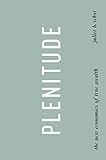
Many, including writer Juliet Schor,question the underlying assumptions of the consumerist mentality. She has just written a new book about it – Plenitude: The New Economics of True Wealth.
Once most Americans could meet basic biological needs, spending took on a heightened social meaning. Spending has become a social phenomenon, consumerism now builds on our fear of failure. That fear has costs. Schor’s question: Is the high cost of all the stuff we’re accumulating worth the escalating costs to our families, communities and the planet?
The crash of 2008-09 put the nail in the coffin of capitalist business-as-usual. Now the scramble is on as the world searches for a sustainable, green way of living that doesn’t wreck the planet.
Well, that’s the direction Juliet Schor would like to see, anyway. The Boston College sociology professor and best-selling author, Schor has written Plenitude
as a road map for lightening our carbon footprints over the next few years, as the human community adjusts to the unfolding green revolution.
Idealistic? Better make that essential, if the planet is to survive. The US electric power industry registered US$22.2 billion in profits in 2004. But factor in liabilities associated with three kinds of emissions (carbon dioxide, sulfur oxides, and nitrogen oxides) and that profit became a net loss of US$28.2 billion, Schor writes in one of many telling examples.
Plenitude is in the spirit of “small is beautiful” and the sustainability movement of the 1990s, but in a practical, plugged-in way rich in anecdotes and inspiring examples of how to live sustainably and change our values.
The four principles of plenitude are: working fewer hours at “normal” jobs; learning to provide for yourself much of the food and consumer goods you’re used to buying; keeping your consumer life low-cost, low-impact and yet highly satisfying; and revitalising community and social connections.
Schor has plenty of clout when it comes to discussing the human cost of the consumer economy, as the author of the best-selling Born to Buy, The Overworked American and The Overspent American.
This time she takes us to parts of the world where the plenitude vision is emerging. Urban farmers, do-it-yourself renovators, job-sharers, post-carbon visionaries, off-the-grid solar techies and others who are spending less time making money, using what they have more frugally, and making more room for other aspects of their lives, such as learning, nature and community.
These are not the back-to-the-landers of the 1970s – low-tech disciples of Thoreau whose epics of wood chopping were “hopelessly romantic”, Schor writes. “Self-providing is great, but it needs advanced technology to be liberating.”
Brains, not brawn, will drive Schor’s brave new world.
Plenitude is refreshingly free of jargon and new-age generalisations. Schor does like to use the phrase “one-planet living” – as in, this is the only orb we have to live on. Maybe it’s time we all did.
powkey Portable Power Station 350W, 260Wh/70,000mAh Backup Lithium Battery, 110V Pure Sine Wave Power Bank with 2 AC Outlets, Portable Generator for Outdoors Camping Travel Hunting Emergency
Now retrieving the rating.
$192.98 (as of April 24, 2024 13:58 GMT +01:00 - More infoProduct prices and availability are accurate as of the date/time indicated and are subject to change. Any price and availability information displayed on [relevant Amazon Site(s), as applicable] at the time of purchase will apply to the purchase of this product.)Amazon Visa
Now retrieving the rating.
$23.00 (as of April 24, 2024 13:58 GMT +01:00 - More infoProduct prices and availability are accurate as of the date/time indicated and are subject to change. Any price and availability information displayed on [relevant Amazon Site(s), as applicable] at the time of purchase will apply to the purchase of this product.)200W Portable Power Station, Powkey 120Wh/33,000mAh Power Bank with AC Outlet, 110V 6 Outputs Solar Generator External Battery Pack with LED Light for Home Use and Outdoor Camping
Now retrieving the rating.
31% OffAnker Power Bank Power Station 60,000mAh,Portable Outdoor Generator 87W with Smart Digital Display, Retractable Auto Lighting and SOS Mode, Home Backup(PowerCore Reserve 192Wh) for Travel, Camping
Now retrieving the rating.
$149.99 (as of April 24, 2024 13:58 GMT +01:00 - More infoProduct prices and availability are accurate as of the date/time indicated and are subject to change. Any price and availability information displayed on [relevant Amazon Site(s), as applicable] at the time of purchase will apply to the purchase of this product.)Foldable Solar Panel Charger 60W with 18V DC Output (11 Connectors) for 100W~350W Portable Power Stations Jackery/Rockpals/Flashfish/Enginstar, Portable Solar Generator for Outdoor Camping Van RV Trip
Now retrieving the rating.
$98.99 (as of April 24, 2024 13:58 GMT +01:00 - More infoProduct prices and availability are accurate as of the date/time indicated and are subject to change. Any price and availability information displayed on [relevant Amazon Site(s), as applicable] at the time of purchase will apply to the purchase of this product.)





One Response
Thank you for writing this book!! At last, someone who understands that Economic justice can never take place without Social Justice happening first within Community!! Good for you for believing in the better side of human nature and those possibilities of change outside of “greed” through conscience and savoring of relationships. A great way to live as far as I am concerned. A must read for me this summer and on the coffee table!! I was a psych and soc major and would love to know if you are ever coming to DC area to lecture???
Kudos to you for a work well done. Heard your interview on NPR, joanne tomasello